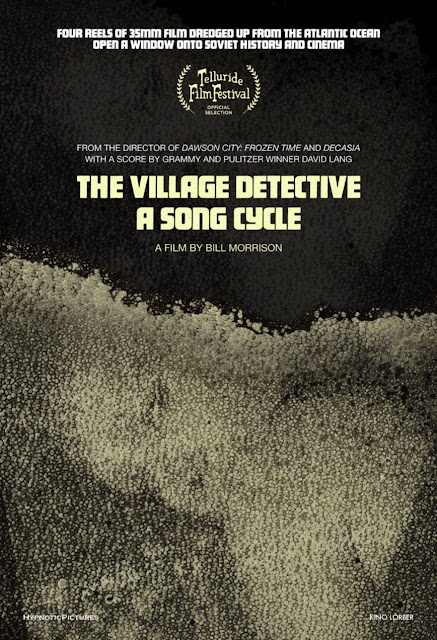Part of the Cinema Regained strand from this year's IFFR was Bill Morrison's The Village Detective - A Song Cycle. Picking up where he left off with Dawson City: Frozen Time, the story of Morrison's latest film begins with an email he received from the great, sadly departed composer Johan Johansson, who heard about a canister containing four reels of film that had been dredged up from the sea bed by a lobster trawler off the coast of his native Iceland. With hopes from Morrison and the National Film Archive of Iceland that it would be a lost silent classic, it turned out to be Derevenskij Detectiv (The Village Detective), a 1969 Soviet film that was considered neither lost or rare. Diving headfirst into the history of the film and its star Mikhail Zharov, Morrison uses clips from "lost" films like 1917's The Fall of the Romanoffs and from Zharov's many big screen credits to chart his career and the history of Soviet cinema.
Considered at the time to be a star on the same level as Humphrey Bogart or Clark Gable, here Zharov stands in for all the forgotten actors from cinema's first 50 years, whose credits are reduced to a potted history in film history textbooks. Donning wigs and beards to play everything from prisoners of a regime to noted dignitaries, it's fascinating to watch his career across the decades, from young supporting actor in 1915's Tsar Ivan the Terrible to his role as Aniskin in The Village Detective, that became a regular role towards the end of his life.
As the film plays out for us - including the sprockets that fill the frame - and the image distorts, it's almost impossible to decipher, but it's that unique power of cinema language that means we want to. Piecing the fragments together in our brain in order to understand the narrative (helped by David Lang's accordion score), what we're watching in its purest form is a collection of still images that lay underwater for decades, but that with the help of a bright bulb and some forward motion are able in all its damaged, corrupted glory to still tell us a story. It's a brilliant, breathtaking experience that will fill you with immense nostalgia for the format and a renewed hope that these films aren't lost to time. No-one's going to find a DCP drive at the bottom of the ocean in 50 years, and if they do it's not going to be of much use to anyone, but here, as we reach the end and watch the image deteriorate before our eyes, it's a beautiful thing to watch.
Verdict
5/5



No comments:
Post a Comment